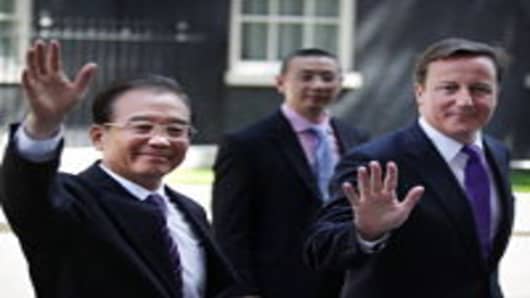Zhu Min, the Deputy Managing Director of the International Monetary Fund, told the media on Thursday that policymakers cannot just rely on liquidity to solve the current crisis. Instead, he said, there needed to be “a reform of the whole structure.”
“If we would rely only on liquidity we won't resolve the problem,” Zhu said on the sidelines of the World Economic Forum in Dalian, China.
Three years after the outbreak of the global financial crisis, and despite trillions of dollars of monetary and fiscal stimulus, policymakers and leaders seem to be suggesting they are willing to look at bigger steps to solve global economic imbalances and kick-start growth.
The first signs of what kind of bargain could be struck between the major countries came on Wednesday, when China’s premier Wen Jiabao offered to help Europe in return for full market status.
Li Daokui, an advisor to China’s central bank went even further suggesting that China and other countries had trillions of dollars they were willing to invest as long as the U.S. and Europe opened their markets to Chinese investments in infrastructure and other assets.
Laura Tyson, the former chairperson of the Council of Economic Advisors under Bill Clinton, told CNBC that investors should listen for hints from the G20 on what a bargain between the different sides would look like.
The G20 finance ministers meet in Washington next week, followed by a meeting of the heads of states in early November in France.
A solution, she said, would likely come in two parts: the first would require the European Union to solve its banking problem, and the second would address global economic imbalances, where China and the U.S. would play key roles.
“There are different elements of the grand bargain,” she told CNBC on the sidelines of the summer meeting of the World Economic Forum in Dalian, China. “If there’s an immediate problem involving the European banking system — then that has to first be resolved as a grand bargain within Europe itself.”
“I think everyone recognizes...that over the next 10 years we have to make modifications to the international monetary system,” she added.
China’s current account surplus and its undervalued currency are likely to be a key sticking point.
“I’ve been involved in conversations in China where people have been talking about their burden of their excess reserves and all their dollars – they’re still accumulating huge amounts of reserves and that to me suggests an exchange rate issue that on their side has not been addressed,” Tyson said.
But China is already showing its willingness to negotiate. Wen highlighted in his keynote speech at the WEF on Wednesday that boosting Chinese consumption was a goal for policymakers. People’s Bank of China’s Li Daokui also said China may allow its currency to be fully floated in 5 years. Both steps would significantly boost the purchasing power of Chinese consumers and thus help U.S. and European exports.
But the “grand bargain”, if it happens, will involve tough political choices, especially for Washington. Tyson says Congress would need to work to reduce the fiscal deficit to show China it was serious about reforms.
“If the Congress could agree on a $4 trillion package this fall, the U.S. would actually be making a commitment or taking action on something the U.S. and China have been discussing for some time,” she said.


